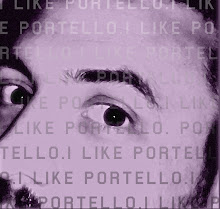The Golden Compass, adapted from the novel Northern Lights by Philip Pullman, is the latest, and by far the best, Nicole Kidman movie to recently grace our screens. Part of its appeal is that our Nic isn't in it all that much, and when she is, her particular brand of scenery-chewing actually works quite well.
It turns out that our Nic has a great line in badass-witch types, so it strikes me after watching this that she should stick to evil roles from now on. Maybe if she'd played Endora instead of Samantha in Bewitched it wouldn't have sucked so bad.
The Golden Compass is an alternate-world steampunk fantasy, following the adventures of Lyra Belacqua, a young orphan ward of Oxford College. Early on in the piece Lyra is entrusted with an alethiometer, or golden compass; a device which allows its user to find the Truth in any situation. Handy, but it also makes her the target of all sorts of nasty types (like our Nic) who want to steal it, destroy it, use it for nefarious purposes, etc.
The fantasy world the story moves through is beautifully realised, with lots of thought-provoking metaphysical elements a simple part of everyday goings-on. In this world a person's soul is real and tangible, taking the material form of an animal familiar called a daemon. As a child, the daemon is constantly changing form, but settles down into one form as the child becomes an adult. You could spend hours (and I'm sure the nerds will) dissecting the constant changes in form the childrens' daemons take, what it eventually settles on for the adults (like our Nic's golden monkey(!)) and what all this represents.
The cast is your basic who's-who of British stage and screen with Daniel Craig, Derek Jacobi, Christopher Lee and Eva Green, and features the voices of Ian McShane, Sir Ian McKellen and Kristin Scott Thomas. Sam Elliott has a fantastic turn as an old-school wild west gunslinger type who for some reason, which I can only suppose is due to Mr Elliott's brilliant performance, does not come across as ridiculously anachronistic. Quite the opposite, in fact.
The kids on whose narrow shoulders rests most of the film's emotional connection do pretty well, with Dakota Blue Richards particularly good as headstrong mini-skeptic Lyra.
The creature work and visual effects are the requisite level of spectacular (although like Lord of the Rings they still haven't got the human-riding-mythical-beast movements to look real . . . is someone looking into this?) and the steampunk elements of the art design are truly great. The beautiful clockwork devices, giant zeppelins and funky-looking horseless carriages make the world presented almost familiar, but not quite.
It's sad, but it all somehow ends up being less than the sum of its parts. The film lurches from set-piece to set-piece with little in the way of exposition, and overall, it feels a bit rushed. At times it was like we were watching a best-bits distillation of a six episode miniseries, and maybe that would have been a better option for the adaptation. But even sticking with the feature film format, at 113 minutes it's not even close to the bladder-challenging Return of the King, so they could have easily spent more time padding some of the scenes out a bit.
Of course, the elephant in the room (given some of my recent thoughts on religion) is the accusation that the film has an atheist agenda, with the arch-villains of the piece being The Magisterium, a thinly-veiled reference to the Catholic church. In the novel the veil is that much thinner, with the group referred to simply as The Church.
But like Monty Python's Life of Brian, this is an unfair accusation. Simply opposing church authority does not an atheist make.
The film says precisely nothing about God or belief or, in fact, religion. Skeptics could easily argue just as validly that it's all too fantastical, particularly in its acceptance of metaphysics as the normal sort of thing.
But back to the accusation of atheism: similar to Life of Brian, this film questions the appropriateness of a single self-appointed body having ultimate Authority (a word much used in the film) over those who don't subscribe to its beliefs. In The Golden Compass it's especially heinous, as this Authority extends to suppressing knowledge, information and scientific investigation. While questioning the Church's authority may be heresy (another word much used in the film) it's certainly not atheism.
I was actually hoping that this would be a nice slice of atheism-for-kids, because there's a notable dearth of it out there. Kid's entertainment is heavily dominated by stories from the Bible, and in the interests of balance, there should be something showing the other side.
But as an exhortation to kids (and the rest of us) to always keep an open mind, to always question people's motives and not to put your faith in shadowy authority, this is very valuable stuff.
3.5 out of 5
Wednesday, 2 January 2008
Subscribe to:
Post Comments (Atom)



3 comments:
I found Mrs Coulters relationship with her daemon really quite creepy. She made my skin crawl.
I agree with your observation on Nicole. Ive never taken to her myself (apart from the fact that I love it when aussies kick ass!!) and I think its because of her cold warmth. Maybe this movie will sway me. But yes, its like Hugh Grant should only ever play cads! The book's author was definitely anti-religion but the movie makers seem to have veered away from that? Cant upset everyone can we? I'd see it just for Sam Elliott.
As for "The Church" being evil ---- NEVER!! lol
Sue
ps you watched Bewitched? :)
Hi Bianca . . . yes it was. Being in touch with your soul is one thing, but seriously!
And hi Sue . . . cold warmth? Interesting way to put it!
Post a Comment